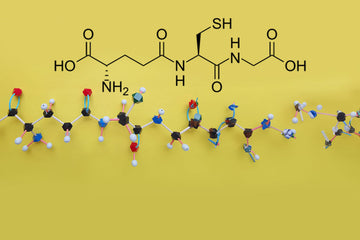

Liposomal glutathione for hangover: Fact or Fiction?
Table of Contents
We've all been there - enjoying a night out with friends and waking up the next morning to a pounding headache and an upset stomach. Hangovers can be brutal, but what if we told you there was a way to reduce their effects?
In recent years, liposomal glutathione has gained popularity as a potential hangover cure. But is it too good to be true? In this blog, we'll dive into the science behind hangovers and glutathione's role in the body. We'll explore the connection between glutathione and hangovers, including the potential benefits of using liposomal glutathione as a solution.
So, if you're tired of waking up feeling terrible after a night out, keep reading to find out if liposomal glutathione supplement is the ultimate cure for your hangovers!
Understanding Alcohol Hangovers and Effects
An alcohol hangover is a group of unpleasant symptoms that occur after drinking too much alcohol. The symptoms typically start several hours after the person stops drinking and can last for up to 24 hours.
Effects of Alcohol
- Headache
- Nausea
- Vomiting
- Fatigue
- Muscle aches
- Anxiety
- Depression
- Difficulty concentrating
- Sensitivity to light and sound
- Increased thirst
The Role of Alcohol in Triggering Hangovers
Alcohol, known for its association with hangovers, plays a significant role in triggering these unpleasant after-effects. As a diuretic, it increases urine production, leading to dehydration and potentially exacerbating hangover symptoms. When alcohol is metabolized, it produces toxic byproducts like acetaldehyde, which contribute to the discomfort experienced during a hangover.
Congeners, found in certain alcoholic beverages like red wine and cocktails, can further worsen hangovers. Additionally, alcohol consumption can cause inflammation and oxidative stress in the body, adding to the intensity of hangover symptoms. The type and amount of alcohol consumed also play a role in the severity of hangovers.
Liposomal Glutathione: A New Solution?
Enhance your hangover relief with liposomal glutathione, a specialized form of this powerful antioxidant. With enhanced absorption and bioavailability, liposomal glutathione allows higher doses to reach your bloodstream. Remember to consult a healthcare professional before starting any new supplement regimen.
What Makes Liposomal Glutathione Different?
Liposomal glutathione stands out due to its unique delivery system. Utilizing liposomes, it enhances absorption and bypasses digestion for direct bloodstream access. Encapsulation protects the glutathione, ensuring stability and maximizing effectiveness. This convenient method may offer a more efficient way to increase glutathione levels in the body.
How is Liposomal Glutathione Administered?
Liposomal glutathione is typically taken orally, either in liquid or capsule form. It should be consumed with water and the recommended dosage may vary depending on individual needs. It is important to follow the instructions provided by the manufacturer or healthcare professional.

Is Liposomal Glutathione the Ultimate Cure for Hangovers?
While liposomal glutathione may alleviate hangover symptoms for some, it is not a guaranteed cure. Its effectiveness varies from person to person. Remember, hydration, nutrition, and sleep also play crucial roles in hangover prevention. Consult a healthcare professional before using any supplements.
Unfortunately, there is currently a lack of open-access research examining the impact of glutathione on hangovers. Nevertheless, a study involving rats administered N-acetylcysteine (NAC), a substance that precedes the production of glutathione in the body, found that the resulting glutathione production led to a reduction in overall oxidative stress after alcohol consumption. Consequently, consuming glutathione while experiencing a hangover might accelerate your body's ability to regenerate depleted antioxidants and eliminate the free radicals generated by alcohol.
Debunking the Myths: When Liposomal Glutathione Doesn't Work
Liposomal glutathione is a form of glutathione that is enclosed in liposomes, which are microscopic spheres made of fat. This allows the glutathione to be more easily absorbed by the body, as it is able to bypass the digestive system.
Glutathione is a powerful antioxidant that plays a role in many important bodily functions, including detoxification, immunity, and cell repair. It is thought that liposomal glutathione may be more effective than other forms of glutathione supplements, due to its better absorption.
However, there are some cases in which liposomal glutathione may not work as expected. Here are some possible reasons why:
- You are not taking enough. The recommended dose of liposomal glutathione varies depending on the individual's needs and the product being used. It is important to follow the dosage instructions on the product label.
- You are taking it at the wrong time. Liposomal glutathione should be taken on an empty stomach, at least 30 minutes before eating or drinking anything else. This allows for the best absorption.
- You are interacting with other medications. Liposomal glutathione may interact with certain medications, such as blood thinners and chemotherapy drugs. It is important to talk to your doctor before taking liposomal glutathione, especially if you are taking any other medications.
- You are not taking it for long enough. It may take some time to see the effects of liposomal glutathione. It is generally recommended to take it for at least 4 weeks before evaluating its effectiveness.
If you are taking liposomal glutathione and not seeing any results, it is important to consider the above factors. You may also want to talk to your doctor about other ways to boost your glutathione levels, such as eating a healthy diet and getting regular exercise.

So, Is Liposomal Glutathione a Reliable Hangover Solution?
Liposomal glutathione is a form of glutathione that is encapsulated in liposomes, which are tiny spheres made of fat. This allows the glutathione to be absorbed more easily by the body.
Glutathione is a tripeptide that is made up of three amino acids: cysteine, glycine, and glutamic acid. It is found in all cells of the body and plays a role in many important processes, including detoxification, cell repair, and immune function.
There is some evidence that liposomal glutathione may be helpful for hangovers. A study published in the journal Alcoholism: Clinical & Experimental Research found that liposomal glutathione reduced the severity of hangover symptoms in people who had consumed excessive amounts of alcohol. The study participants who took liposomal glutathione reported less headache, nausea, and fatigue than those who did not take it.
Another study, published in the journal Drug and Alcohol Dependence, found that liposomal glutathione reduced the levels of acetaldehyde in the blood. Acetaldehyde is a toxic byproduct of alcohol metabolism that is thought to be responsible for many of the symptoms of a hangover.
However, more research is needed to confirm the effectiveness of liposomal glutathione for hangovers. The studies that have been conducted so far have been small and involved a limited number of participants.
Let’s Sum Up
In conclusion, while liposomal glutathione may have some potential benefits for reducing hangover symptoms, it is important to approach it with caution. The scientific evidence supporting its effectiveness is limited, and individual results may vary. It is always recommended to practice moderation when consuming alcohol and to take other measures to prevent and alleviate hangovers, such as staying hydrated, eating a balanced meal before drinking, and getting plenty of rest.
Additionally, incorporating vitamins, minerals, and herbal remedies into your hangover recovery routine may provide additional support. If you are considering trying liposomal glutathione or any other supplements for hangovers, it is best to consult with a healthcare professional to ensure it is safe for you.
Check out the best selling Liposomal Glutathione Supplement in USA.




















